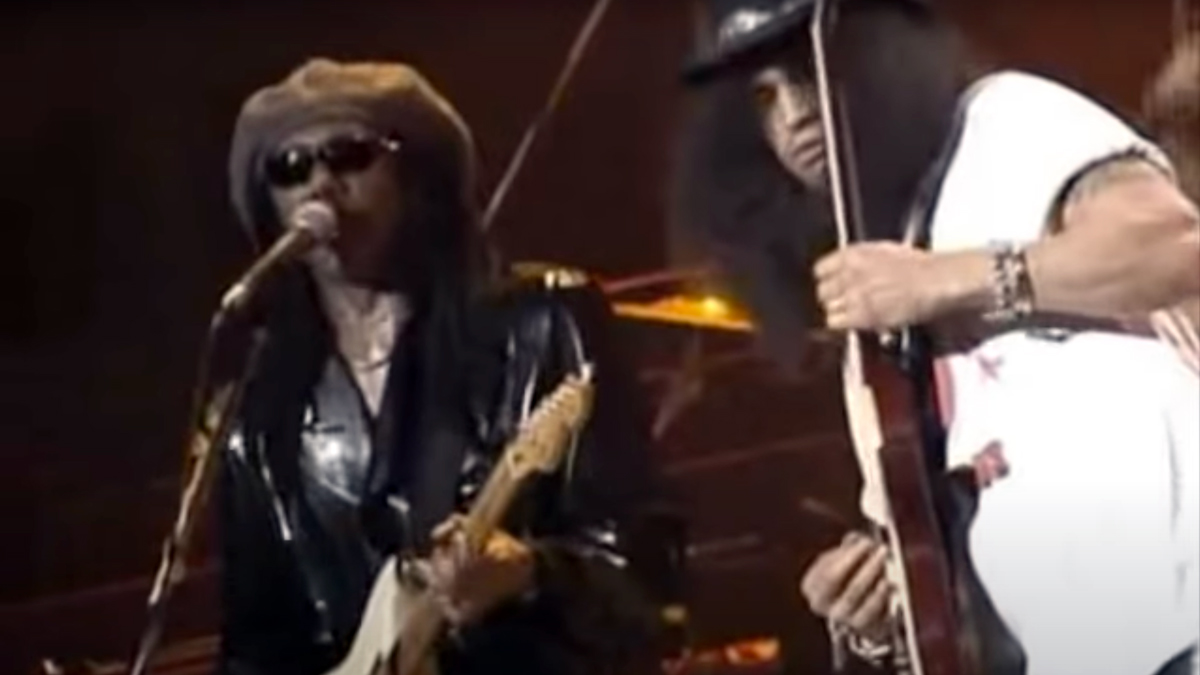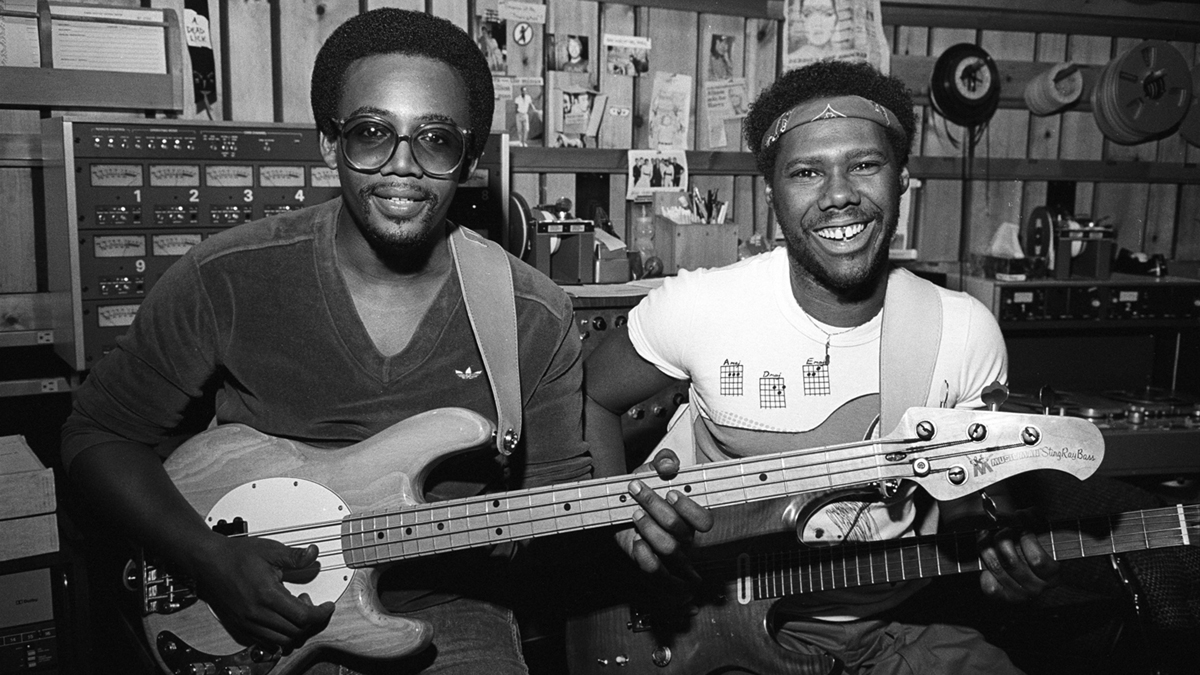Slash once joined Nile Rodgers and Chic for a marathon Le Freak solo spot – but the show ended in tragedy
Watch the 1996 performance the Guns N’ Roses guitarist called “the biggest privilege of my life” – at the concert that would prove to be bass legend Bernard Edwards’ last

Slash was at a crossroads. By 1996, tensions in Guns N’ Roses had reached fever pitch, as Axl Rose sought to wrestle full creative control from his bandmates. The guitar hero had been distracting himself from his band’s forthcoming implosion by recording and touring new music under the Slash’s Snakepit banner, accompanied by GNR bandmates Matt Sorum and Gilby Clarke. That group lasted two years, before it was put on the backburner in favor of Slash’s Blues Ball, a covers outfit that kept its namesake’s lust for live in check for another year.
Away from the GNR behemoth, Slash was restless. So when the offer came to join recently reformed disco-funk legends Chic for a guest spot at Japan’s legendary Budokan arena, he hopped straight on a plane.
On paper, it’s an unlikely pairing: Slash is known for ’80s rock’s quintessential overdriven solos; Rodgers for soundtracking the ’70s via the tightest, cleanest rhythm chops to ever grace a discotheque sound system.
Yet the pair had a prior connection that bridged any musical waters: Slash’s mom.
“Slash is like my brother from another mother,” Rodgers told Hot Press in 2017. “Actually, I was friends with his mom, Ola Hudson… She was always bragging about her young son, who was this incredible guitar player in a band called Guns N’ Roses but they hadn’t gotten a record deal yet. How quickly did that change?”
Slash and Rodgers’ musical paths would eventually cross on the soundtrack to Quentin Tarantino-produced crime flick Curdled, for which they co-wrote two tracks, but the Budokan marked their live performance debut.
Held on April 17, 1996, the event was dubbed JT Super Producer, celebrating Rodgers’ production prowess and Chic’s enduring legacy, and along with Slash, featured fellow collaborators Steve Winwood and Sister Sledge.
Get The Pick Newsletter
All the latest guitar news, interviews, lessons, reviews, deals and more, direct to your inbox!
According to Rodgers, the GNR guitarist had two rehearsals with the group before he hit the stage for a series of cameos: most notably, an extended lead break on setlist opener Le Freak, and a cover of Jimi Hendrix classic Stone Free as the concert came to a close (he also featured on versions of the Spencer Davis Group’s Gimme Some Lovin’ and Winwood’s Higher Love, but these tracks didn’t make it to the eventual album release). On every occasion, says Rodgers, “he nailed it!”
Watching the footage back, it’s hard to argue. Given the briefest of introductions by Rodgers just seconds before he bounds onto the stage – we wish we could yell “Slash!” to make the top-hatted one appear at any given moment – Mr Hudson wastes no time in ripping his finest six-string yarns during Le Freak.
Hell hath no fury like Slash tearing through that minor pentatonic box, and no genre is going to hold him back. But as the guitar icon ventures up the fretboard, he eases off on the accelerator just enough to highlight the tasty passing notes between his held bends and syncopated doublestops.
As the lead fireworks come to an end, Slash stays onstage to hammer out Le Freak’s trademark riff with lashings of overdrive and plenty of Cry Baby. And, naturally, a few more lead breaks for good measure.
Rodgers would later describe Slash’s appearance at the show as “one of the proudest moments of my life”, and his guest star repaid the favor.
“He’s an absolute genius,” Slash would later say of Rodgers. “The biggest privilege of my life is getting to play with Nile Rodgers and Chic.”
Yet for all the celebration, the evening ended in tragedy. Bernard Edwards, Chic’s bass player and the man responsible for one of the greatest basslines of all time in Good Times, had been feeling unwell prior to the Budokan show. Rodgers had insisted they postpone, but Edwards persisted in performing, even blacking out at points during the gig.
“He passed out on stage and we revived him and he continued playing the show, which surprised the hell out of me,” Rodgers told The Guardian. “I didn’t even know he had passed out.”
After the concert, Rodgers checked in on how the bassist was feeling, to which he replied, “I'm fine, I just need to rest.” It would be the last time the musical partners spoke: Edwards died at the age of 43 later that night – Rodgers found his body the following morning when he failed to answer his wake-up call. Pneumonia was identified as the cause of death.
“I lost it completely. But I had to get it together because all my life he'd protected me, looked after me, and now I had to take care of him,” Rodgers told The Independent of the moment he found Edwards’ body.
“I turned from Nile Rodgers, partner of Bernard Edwards, into a guy doing a gig for people who care about the music. Bernard said the last night of his life, ‘The music is bigger than we are.’ So I'm not there to be me; I'm there to do the music.”

The live album Live at the Budokan eventually saw the light of day on February 23, 1999. The release was entirely unedited, including moments where Edwards stopped playing due to his illness.
Chic continue to tour today with new musicians, commemorating the band, Rodgers’ production magic and Edwards’ own legacy. And in 2008, Slash would even reprise his Le Freak guest appearance for a performance in aid of Rodgers’ non-profit organization, the We Are Family Foundation.
Despite the circumstances that immediately followed the concert itself, Live at the Budokan remains in many ways the ultimate celebration of Chic’s lasting impact on the world of popular music: a universal sound that’s bigger than life or death, and one that built a bridge between music of all genres – even the disparate tribes of ’70s disco and ’80s hard-rock.

Mike is Editor-in-Chief of GuitarWorld.com, in addition to being an offset fiend and recovering pedal addict. He has a master's degree in journalism from Cardiff University, and over a decade's experience writing and editing for guitar publications including MusicRadar, Total Guitar and Guitarist, as well as 20 years of recording and live experience in original and function bands. During his career, he has interviewed the likes of John Frusciante, Chris Cornell, Tom Morello, Matt Bellamy, Kirk Hammett, Jerry Cantrell, Joe Satriani, Tom DeLonge, Ed O'Brien, Polyphia, Tosin Abasi, Yvette Young and many more. In his free time, you'll find him making progressive instrumental rock under the nom de plume Maebe.
“Even the thought that Clapton might have seen a few seconds of my video feels surreal. But I’m truly honored”: Eric Clapton names Japanese neo-soul guitarist as one to watch
“You better be ready to prove it’s something you can do”: Giacomo Turra got exposed – but real guitar virtuosos are being wrongly accused of fakery, too










